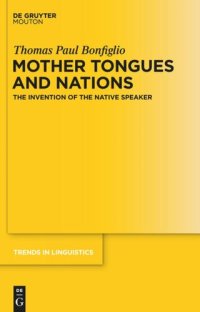
Ebook: Mother Tongues and Nations: The Invention of the Native Speaker
Author: Thomas Paul Bonfiglio
- Series: Trends in Linguistics. Studies and Monographs [TiLSM], 226
- Year: 2010
- Publisher: De Gruyter Mouton
- Language: English
- pdf
This monograph examines the ideological legacy of the the apparently innocent kinship metaphors of “mother tongue” and “native speaker” by historicizing their linguistic development. It shows how the early nation states constructed the ideology of ethnolinguistic nationalism, a composite of national language, identity, geography, and race. This ideology invented myths of congenital communities that configured the national language in a symbiotic matrix between body and physical environment and as the ethnic and corporeal ownership of national identity and local organic nature. These ethno-nationalist gestures informed the philology of the early modern era and generated arboreal and genealogical models of language, culminating most divisively in the race conscious discourse of the Indo-European hypothesis of the 19th century. The philosophical theories of organicism also contributed to these ideologies. The fundamentally nationalist conflation of race and language was and is the catalyst for subsequent permutations of ethnolinguistic discrimination, which continue today. Scholarship should scrutinize the tendency to overextend biological metaphors in the study of language, as these can encourage, however surreptitiously, genetic and racial impressions of language.
- First book to historicize the metaphors of "mother tongue" and "native speaker" as products of the anxieties of national identity in the emergent nation states.
- Demonstates that organicist theories of language are of folkloric origin, as are the arboreal models for language — the “family trees” — that they generated.
- The illumination of the current persistence of the biologizing and consequential racializing of language in the confusion between competence and performance.